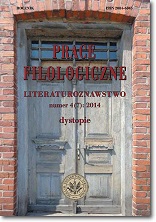{Locus horribilis} pod zamkniętymi drzwiami. Trzy paraklausithyra Johannesa Secundusa (el. I 5, II 5, III 1) wobec tradycji klasycznej
{Locus horribilis} behind the closed door. Three paraclausithyra by Johannes Secundus (el. I 5, II 5, III 1) in the light of classical tradition
Author(s): Grażyna Urban-GodziekSubject(s): Literary Texts
Published by: Wydział Polonistyki Uniwersytetu Warszawskiego
Keywords: paraklausithyron; elegia miłosna; Johannes Secundus; poezja nowołacińska; eschatologia elegijna; paraclausithyron; love elegy; Johannes Secundus; Neo-Latin poetry; elegiac eschatology
Summary/Abstract: The article presents an elegiac motif of paraclausithyron (a song sung behind the closed door) in the poetical output of a Dutch Latinist, Johannes Secundus (1511–1536). The night vigil behind the closed door experienced by a rejected poet-lover who tries in vain to gain his beloved’s favour and access to her alcove is compared by the Roman elegiacs (Prop. II 17, Tib. I 3) to the infernal torments of the mythical heroes: Tantalus, Ixion, Sisyphus and Tytios. Being very close to their goal, yet unable to get the object of their desire, they suffer a great anxiety. This kind of metaphor, taken probably from Lucretius, finds its continuationeven later (Paulus Silentiarius), and is developed in the Renaissance poetry. Two scandalous paraclausithyra(el. II 5 and III 1) by Secundus–not yet analysed in the light of this convention – seem to be the settlement with ancient masters, who were proudly announcing that each girl could be conquered with their poems (Prop. III 2; Ovid.{Am.} II 1). At the same time, it is an ironic reinterpretation of Secundus’s own triumphalism, and of his previous belief in the power of his own poetry – the poetry which is actually more important than its subject matter– love. However, behind the closed door and in confrontation with the rival’s money, the song loses its supernatural power and the hurt feeling bringshellish torments to the poet. In the elegiac paraclausithyrathe threshold of an inaccessible house defines the lover’s {locus horribilis}. Staying in such an {inferno} brings the desire of revenge and the will to expose the guilty ones to eternal torment. This initiates an eschatological perspective (inscribed in the represented elegiac world), where true lovers receive the Elysian award, while their traitors and rivals – eternal punishment (Tib. I 3; Prop. IV 7, and others Renaissance elegiacs).
Journal: Prace Filologiczne. Literaturoznawstwo [PFLIT]
- Issue Year: 2014
- Issue No: 4 (7)
- Page Range: 17-33
- Page Count: 17
- Language: Polish

